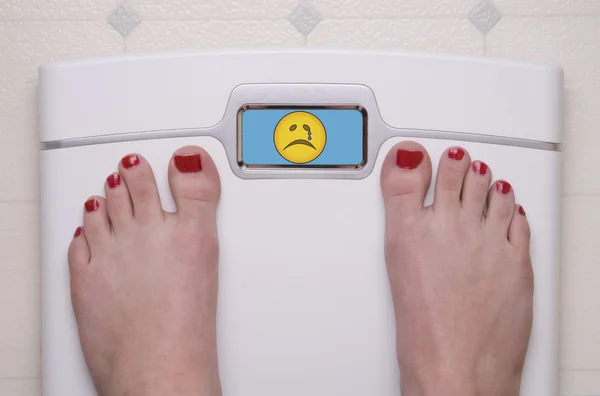Did you know that there is a link between mental health and obesity? Recent studies have shown that people who are depressed are more likely to be obese, and people who are obese are more likely to be depressed. This may seem like a chicken-and-egg situation, but the fact remains that there is a correlation between these two conditions. In this blog post, we will discuss the link between depression and weight gain, and we will offer some tips for how to deal with this problem.
Contents
Defining Depression
Before getting into the details of the link between depression and weight gain, it is important to understand what depression is. Depression is more than just feeling sad or down; it is a serious mental health condition that can have a profound impact on every aspect of a person’s life. According to the National Institute of Mental Health, some common symptoms of depression include:
- Persistent feelings of sadness, anxiousness, or “empty” mood
- Loss of interest in activities that were once enjoyed
- Changes in appetite or weight (either gaining or losing)
- Trouble sleeping or sleeping too much
- Loss of energy or increased fatigue
- Difficulty concentrating, remembering, or making decisions
- Feelings of worthlessness, hopelessness, or guilt
- Thoughts of death or suicide
If you are experiencing any of these symptoms, it is important to seek help from a mental health professional. Depression is a treatable condition, but it will not go away on its own.
Link Between Depression and Weight Gain
 Now that we know more clarity about depression, let us begin to explore the link between depression and weight gain. As we mentioned before, there is a correlation between these two conditions. People who are depressed are more likely to be obese, and people who are obese are more likely to be depressed. This may seem like a chicken-and-egg situation, but the fact remains that there is a connection between mental health and obesity.
Now that we know more clarity about depression, let us begin to explore the link between depression and weight gain. As we mentioned before, there is a correlation between these two conditions. People who are depressed are more likely to be obese, and people who are obese are more likely to be depressed. This may seem like a chicken-and-egg situation, but the fact remains that there is a connection between mental health and obesity.
There are a few possible explanations for this link.
- First, depression can lead to changes in appetite and eating habits. People who are depressed may have a tendency to overeat. They may indulge in, what we call, emotional eating. This means that they eat in response to their emotions, rather than in response to hunger. As a result, they may consume more calories than they need, and this can lead to weight gain.
- Second, depression can also lead to changes in activity levels. People who are depressed may have little energy or motivation to be active. They may spend more time being sedentary, and this can lead to weight gain.
- Third, depression can also affect the body’s metabolism. Studies have shown that people who are depressed tend to have a slower metabolism than people who are not depressed. This means that they burn fewer calories, and this can lead to weight gain.
- Some people also tend to overlook the fact that obesity can lead to depression. People who are obese may feel self-conscious about their weight. They may feel like they are not meeting society’s standards of beauty, and this can lead to low self-esteem and depression.
- In addition, people who are obese may have difficulty moving around, and this can lead to feelings of isolation and loneliness.
- Many people with depression take medication, which can also lead to weight gain. Some common medications used to treat depression are antidepressants, mood stabilizers, and antipsychotics. These medications can increase appetite, cause cravings for certain foods, and lead to changes in metabolism. As a result, they can cause people to gain weight.
- Lastly, the chances of obese people developing depression are high because of the many health problems that are associated with obesity. People who are obese may feel like they are not taking care of their health, and this can lead to depression.
These are all the ways in which weight gain and depression are linked with each other. It is important to understand this connection so that we can better treat both conditions.
Consequences
As we already know, our physical and mental health are linked to each other. Therefore, it is important to take care of both our physical and mental health. When we are dealing with one condition, we should also be aware of the possible effects on our mental health. The same goes for when we are dealing with a mental health condition. We should also be aware of the possible effects on our physical health.
When one starts gaining weight, it is easy to think that it’s no big deal. However, weight gain can lead to a number of health problems, such as:
- obesity
- type II diabetes
- high blood pressure
- cardiovascular disease
- stroke
- migraines
- acne
- arthritis
- sleep apnea
Weight gain can also lead to mental health problems, such as:
- depression
- anxiety
- body dysmorphia
- social isolation
- low self-esteem
It is important to be aware of the consequences of weight gain so that we can take steps to prevent it. Depression and weight gain are two conditions that can have a serious impact on our health. If you are dealing with either of these conditions, it is important to seek help from a professional.
Tips To Manage
 Fortunately, there are ways that can help us manage depression and weight gain. These tips can help manage both conditions and improve our overall health.
Fortunately, there are ways that can help us manage depression and weight gain. These tips can help manage both conditions and improve our overall health.
Firstly, it is important to bring alterations to your lifestyle. Because both these conditions are linked with each other, by making changes to your lifestyle, you can help manage both depression and weight gain. Here are some lifestyle changes that you can make:
- Eat a healthy diet: Eating a nutritious and balanced diet is important for our physical and mental health. Make sure to include plenty of fruits, vegetables, whole grains, and healthy fats in your diet. Avoid processed foods, sugary drinks, and excessive amounts of caffeine.
- Exercise regularly: Exercise is a great way to boost our mood and improve our physical health. It can help reduce stress, anxiety, and depression. It can also help promote weight loss.
- Get enough sleep: Sleep is important for our physical and mental health. Make sure to get at least seven to eight hours of sleep every night.
- Reduce stress: Stress can worsen depression and lead to weight gain. Therefore, it is important to find ways to reduce stress in your life. You can do this by meditating, spending time in nature, or doing something that you enjoy.
Making lifestyle changes can be difficult, but it is important to remember that you are not alone. There are many resources and support groups available to help you make these changes.
Moreover, there are also things you can do to manage your weight and food cravings. Here are some tips to help you manage your weight:
- Avoid dieting: Dieting can lead to weight gain and can worsen depression. Instead of dieting, focus on eating a healthy and balanced diet.
- Eat mindfully: Pay attention to your hunger cues and eat when you are hungry. Avoid eating when you are not hungry or in response to emotions such as stress or boredom.
- Choose healthy foods: When you are grocery shopping, make sure to choose foods that are nutritious and will help you reach your goals.
- Avoid trigger foods: Trigger foods are those that lead to overeating or binge eating. Everyone has different trigger foods, so it is important to be aware of yours.
There are many things that you can do to manage your weight gain and depression. By making lifestyle changes and being mindful of your food choices, you can improve your physical and mental health.
If you are struggling to make these changes on your own, seek help from a professional. Therapists and dietitians can help you develop a plan that is tailored to your specific needs. With their help, you can make the changes necessary to improve your health and well-being. The most common interventions used by these professionals include:
- Cognitive-behavioral therapy: This type of therapy can help you change your thinking and behavioral patterns.
- Interpersonal therapy: This type of therapy can help you improve your relationships and communication skills.
- Medication: In some cases, medication may be necessary to help manage depression or weight gain.
- Nutrition counseling: A dietitian can help you develop a healthy eating plan and make changes to your diet.
- Exercise: A physical therapist can help you develop an exercise plan that is safe and effective.
Making the decision to seek help is a brave step. With the help of a professional, you can make the changes necessary to improve your mental and physical health. If you are struggling with depression or weight gain, please seek help from a qualified professional. They can help you develop a treatment plan that is tailored to your needs.
Conclusion
To end, we can conclude that depression and weight gain are linked with each other. Depression can lead to weight gain, and weight gain can lead to depression. These conditions can have a negative impact on our physical health, mental health, and overall quality of life. If you are struggling with either of these conditions, it is important to seek help from a professional. They can help you manage your health and lead a fulfilling life!
If you or someone you know is looking for psychological help, Therapy Mantra is here for you. We are the leading providers of online therapy and counseling. Our team of highly trained and experienced therapists can provide assistance at the most affordable rates. Contact us today to learn more about our services. You may also visit our website to book an online therapy session or download our free Android or iOS app for more information.


